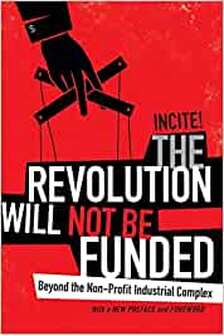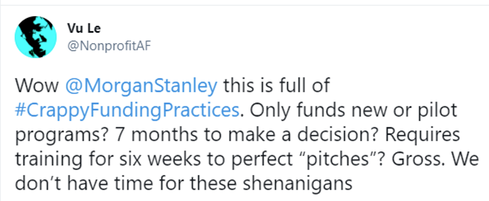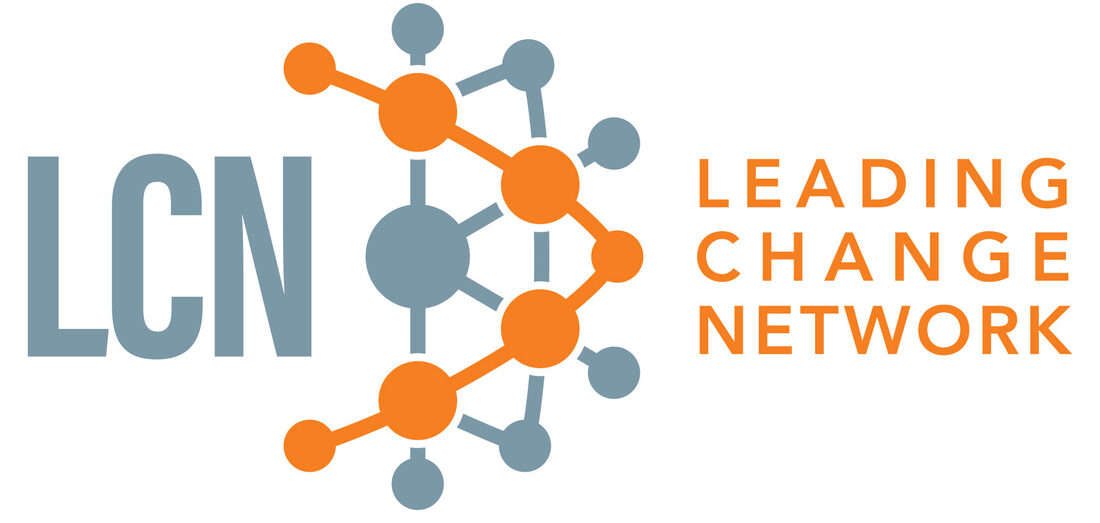|
"Social service work addresses the needs of individuals reeling from the personal and devastating impact of institutional systems of exploitation and violence. Social change work challenges the root causes of the exploitation and violence." (The Revolution Will Not Be Funded) How many of us got into the non-profit sector to do social change work, but ended up doing social service work? How many organizations does this happen to as a reaction to funding structures rather than a strategic decision? Because there is no money for organizing, only for programs and projects, preferably new or pilot programs and projects (not proven ones, those are boring), but only for one year at a time, and certainly no more than 10% on overhead expenses, and you'd better buLIEVE the mandatory quarterly reports will suck your will to live. Sound familiar? That's because the Revolution. Will not. Be funded. As I've mentioned, I've been reading the 2007 book The Revolution Will Not Be Funded, a collection of essays, edited by INCITE!, that I have needed significant time to process. In Paul Kivel's essay "Social Service or Social Change?" we find this little bombshell: "One strategy used by the ruling class to maintain social order has been to fund social welfare programs through government and non-profit agencies. This creates the appearance that the government is responsive, creating an illusion of "progress" while recruiting buffer-zone agents from the groups of people demanding change of the system. But more often than not, the programs are severely underfunded and overregulated; more, they merely provide services, without addressing the structural issues as required to actually eliminate the injustice or inequality motivating people to organize in the first place." Whut. Reactions? How are we feeling reading that? I had a very unlady-like reaction, I don't mind telling you. It was a mixed bag of how-dare-you/OMG-it's-true/I've-been-HAD, for me. He continues, mercilessly: "Today, funders generally support non-profit programming that fills gaps in the government's provision of services, extends outreach to underserved groups, and stress collaboration among social service providers to use money and other resources efficiently, that is, to stretch less money further to cover greater need. [...] The ruling class co-opts leaders from our communities by providing them with jobs in non-profits and government agencies, hence realigning their interests with maintaining the system. [...] The existence of these jobs serves to convince people that tremendous inequalities of wealth are natural and inevitable. Institutionalizing soup kitchens leads people to expect that inevitably there will be people without enough to eat; establishing permanent homeless shelters leads people to think that it is normal for there not to be enough affordable housing." As my 12-year-olds say, "bruh." Are you mad yet? I hope so. Bu-bu-but, government funding might be the worst, but foundation funding is different right? Foundations want to change the world. Right? Maybe not. The Thing About FoundationsFoundations can be great, and lots of important projects have been funded by foundations. We all know that. But are they as great as they could be?
Follow @NonprofitAF on Twitter if you want to laugh/cry as he calls out foundations for #CrappyFundingPractices. Here's one from last week: "Wow @MorganStanley this is full of #CrappyFundingPractices. Only funds new or pilot programs? 7 months to make a decision? Requires training for six weeks to perfect “pitches”? Gross. We don’t have time for these shenanigans." Vu's got our back, friends. How could our philanthropic system be so inefficient, so focused on individual-level aid? It's almost like giving away money wasn't really the primary purpose, no? Truthbomb: Foundations are relatively new in the world, the first one founded in 1907 in the US, and they were largely a tax shelter for the very rich, a place to park excess wealth so descendants could receive their inheritance without paying estate taxes. In the introduction to The Revolution Will Not Be Funded, we read about early efforts of the Rockefeller Foundation, one of the first and largest foundations, to "ameliorate social issues" in a way that "did not challenge capitalism" since they considered "organized workers in the form of unions to be a danger to society." Their focus was on individual relief while simultaneously blocking reports and spinning stories of the Ludlow Massacre resulting from a Colorado miners strike in 1914. This may well be one of the roots of the biggest hurdles faced by social change agents: overcoming the individualization of systemic shortcomings. The US Commission on Industrial Relations warned Congress in 1916 that foundations posed a "grave menace because they concentrated wealth and power in the service of ideology which supported the interests of their capitalist benefactors" (the benefactors being the people who put their money into the foundations, of course.) We also read about the Ford Foundation's history of funding social change movements and then steering them in more conservative directions. While some minimal regulations have been put in place since (like the 3.5% rule, and rules that foundations can't engage in business operations), these are their roots, their purpose. They were established to centre the benefits for the grantors, not the grantees. "Foundation funding and non-profit management not only exhausts us and potentially compromises our radical edge; it also has us persuaded that we cannot do our work without their money and their systems." "Last but not least, let's set the record straight by speaking the truth: foundations are created not only from wealth that was made off the backs of hardworking people, but from a social compact they accepted as a result of major tax benefits their donors received." Put another way, foundations and their boards are inherently unmotivated to fund anything that would disrupt the way power and wealth are distributed, which are the basic tenets of social justice movements. Now, this isn't a call to never write another grant application. If you can get a grant that aligns with your mission where the payoff between the good you can do with the money outweighs the depletion of your time and energy in managing that money, go for it. This is a call to go in eyes wide open, and to consider the risk of relying too heavily on grants. (And if you are a funder, it's a call to examine your funding practices.) But for the rest of us: To whom are we accountable?Money and accountability are linked. Whether the money comes from government, foundations, or our community, there lies our sense of accountability as well. So who do we want to be accountable to? What would be the pros and cons of each option? What would be the risks? It is good practice to consider the risks of having too much of our funding coming from one source. How would we meet payroll if that source dried up? Diversified income streams makes fiscal sense, a strategy to mitigate risk. This is not new. But what about the risk to your mission caused by an overreliance on grant money? Again, from the book: "Ultimately, critiques of the non-profit model are not just about how the revolution is funded, or the dependency it creates, or the way foundations have grown increasingly powerful over the course and content of social justice work. Such critiques are also about the business culture that it imposes, how we have come to adopt and embrace its premises and practices, and the way that it preempts the radical work so urgently needed from a social justice movement. It is very difficult, if not impossible, to maintain political integrity in circumstances that demand a professionalized, businesslike practice. And perhaps that is the point." If we are doing our jobs right fighting for social change, our agenda should be in direct conflict with the agenda of the folks fighting to keep control of the wealth and power. Which leads us to a new (to me) approach to fundraising. Fundraising was one of my first tasks in the non-profit world. I was part of a scrappy upstart with good intentions and not much else. We had renovated a duplex into five apartments for women fleeing violence. When we started, there were supposed to be government rent supplements to bridge the gap between what the women could pay and what it would cost to operate the building - we just had to get the building open and then we'd be set. But by the time we were done, the rent supplements were gone. Of course. So I signed five books about fundraising out from the library and attended a one-day conference at the local college, and became our fundraiser. I loved the organization (I still work there) but I did not like fundraising. Turns out I liked communications more, and I'm grateful that I was able to stay with the organization and shift my focus. But I've been challenged to re-evaluate fundraising by one of the essays in The Revolution Will Not Be Funded, "Fundraising is not a dirty word" by Stephanie Guilloud and William Cordery. The authors differentiate between foundation income and grassroots income, and they make the case for both the freedom that comes from grassroots fundraising, and the increased accountability to the communities most affected by the injustice we are seeking to address. They argue that "grassroots fundraising is a strategy to maintain a firm connection to our base and to initiate community-based economic structures. We define organizing as building relationships and institutions to sustain community power, and it follows that fundraising is organizing." My favourite recent example is Prairie Harm Reduction in Saskatoon. When the government of Saskatchewan denied their application to expand services at their Supervised Consumption Site, the community rallied, and through the efforts of 50 businesses and 450 individual donors, over $180,00 was raised in about one month. A Plug For Social EnterpriseThough the book doesn't mention social enterprise, I'd add a plug for this income stream alongside grassroots fundraising.
Here's how we're thinking through it at that same organization I'm still with:
I'm way over my made-up word limit, and more importantly, I'm at my made-up publish deadline, but consider this a primer, a whistle-wetter if you will, on our need to assess the risks (and rewards!) of our relationships with various funding source options. (I didn't even talk about how if the billionaires just paid their damn taxes in the first place, we could all likely retire. Another day.) I am not particularly risk-averse when it comes to my finances, and I find traditional SWOT analysis a yawn. But THIS risk assessment is one I find very motivating to complete. Hopefully you are inspired to as well.
1 Comment
1/3/2022 04:19:13 am
So much to learn here Jennifer! As someone who is exploring the best ways to structure and ultimately fund a social initiative, I am leaning toward social enterprise but it’s the start up that seems out of reach. I personally see a fine line between becoming too much business and not enough social…Interesting about foundations. I didn’t know about some of the less virtuous motivators :/ I need to get this book! Thanks for your wisdom :)
Reply
Leave a Reply. |
AuthorI'm Jennifer. I am an advocacy and communications strategist working with multiple charities and nonprofits. And I want to disrupt our sector for good. Archives
April 2024
Categories |




 RSS Feed
RSS Feed
